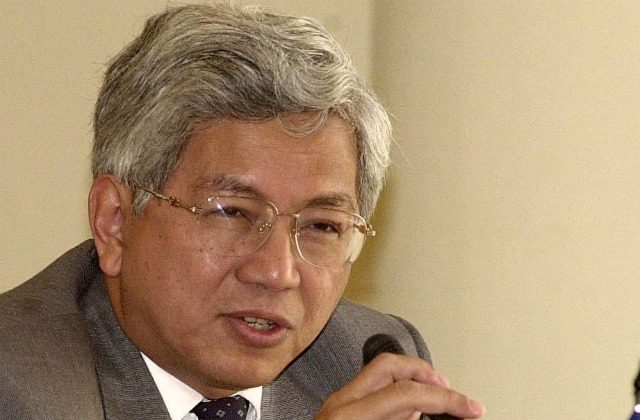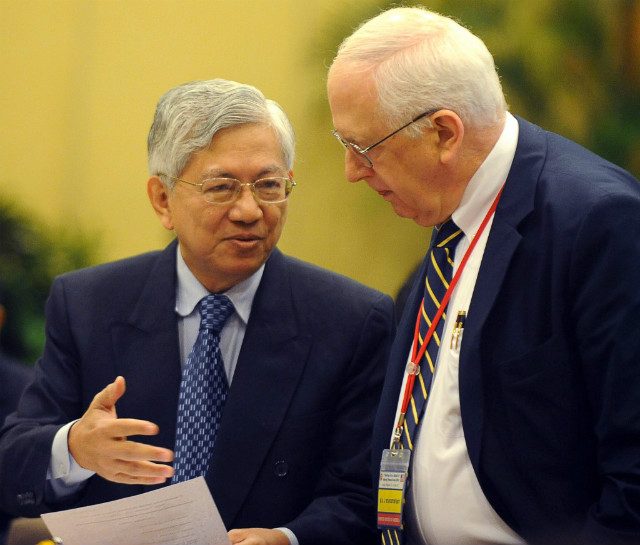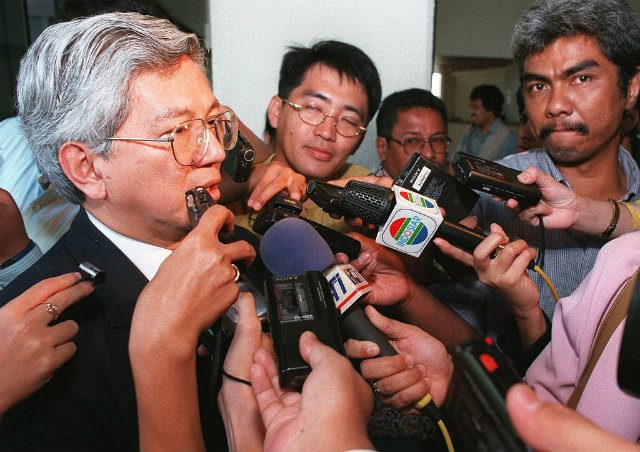SUMMARY
This is AI generated summarization, which may have errors. For context, always refer to the full article.

MANILA, Philippines – How does one open a new bottle of ketchup?
Trying to do this before, journalist Howie Severino remembers himself getting impatient. He wanted to force the bottle open by turning the lid with all his strength.
His father, the late Ambassador Rodolfo “Rod” Severino Jr, got irritated whenever he saw Howie struggling with things like this. “He would say, ‘Don’t force anything. There’s always a logical solution.'”
Howie then learned how to open a new bottle of ketchup – “pukpukin mo lang ‘yung gilid (just tap the sides).” Beyond opening a ketchup bottle, this was one of the lessons he learned from his father: avoiding the use of force, accomplishing things “without showing anger, without losing control.”
“Of course for diplomats, their goal is to avoid war, which is force. So even at home, he would tell us, rather than be frustrated, ‘No, just figure it out. Don’t force it. Figure it out. There’s a way,'” Howie said in an interview with Rappler around midnight on Wednesday, April 23, during his father’s wake.
A strategic thinker who was open to journalists and had the country’s interests at heart, Severino was the complete diplomat, even at home as he raised his children.
Severino died at the age of 82 on Good Friday, April 19, just a week before his birthday. He had been a diplomat for 32 years, capping his career as secretary-general of the Association of Southeast Asian Nations (ASEAN) from 1998 to 2002.
“I don’t recall my father ever raising his voice. I never saw him use violence on anything. He never used corporal punishment on any of his children. He never yelled at us, not even once. But that doesn’t mean he was not strict,” Howie said.
Well-rounded diplomat
Born on April 27, 1936, the late ambassador was the son of Trinidad Certeza and Rodolfo Severino Sr, one of the first Filipino diplomats after World War II. It was Rodolfo Sr who administered his oath when his son Rodolfo Jr entered the Department of Foreign Affairs (DFA) in 1965.
Howie remembers his father as a well-rounded diplomat trained by the best Jesuit minds of Ateneo de Manila – historian Horacio dela Costa, playwright James Reuter, and theologian Catalino Arevalo.
(Howie, whose real name is Horacio, was even named after the late great Dela Costa. Called a “gentle genius,” Dela Costa was Severino’s mentor, who in 1964 became the first Filipino superior of the Philippine Jesuits.)
The journalist said his father was a wordsmith who read a lot of literature, an opera buff who knew a lot of classical music, a man who played sports and loved ballet, and also a gourmet. It was also his father who introduced Howie to directors Akira Kurosawa and Ingmar Bergman.
“Medyo may pagka-high end ‘yung cultural tastes niya eh (He had high-end cultural tastes),” Howie said.
Severino was also “a big admirer” of national hero Jose Rizal. Howie, who is known for his documentaries on the national hero, got his admiration of Rizal from his dad.
“One of the first stories my father ever told me was how Rizal died, and it never left my mind,” Howie said. “It’s the first story I remember, up to now.”
Howie’s father told him, when he was around 7 years old, that the Spaniards “wanted to shoot Rizal in the back for being a traitor, but Rizal knew he was not a traitor to his country, so he refused to be shot in the back.” Rizal, who was trained in fencing, did a pirouette, so he “was shot in the chest, facing the sky as he dropped dead.”
“Imagine, for a lot of people, the first stories that they were told were nursery rhymes or whatever. As for him, he told the death of Rizal – a death, an execution, a violent story. But a meaningful violent story,” Howie said.
“It takes a bit of chutzpah to tell your 7-year-old son this story, in a way that’s not gonna traumatize him,” Howie said.
Man with a vision
At the DFA, Severino is remembered for his strategic vision especially on issues such as the South China Sea dispute.
“Undersecretary Severino was really a treasure in the department. I say a treasure because Undersecretary Severino was one of the few who had a strategic vision,” said Henry Bensurto Jr, Philippine consul general to San Francisco, who considers Severino his mentor.
“He has the ability to look at things from a very strategic perspective. He understands tactical issues but he always looks at the larger picture,” the consul general said.

Severino showed this in the way he dealt with the South China Sea dispute. Bensurto is a living example of this: he can trace to Severino his interest in the South China Sea.
In the middle of discussions about the South China Sea in the early 1990s, Undersecretary Severino told Bensurto, then a junior officer: “Henry, you better specialize in the law of the sea, and try to give it attention.”
“And so I did,” Bensurto said.
Bensurto is now one of the Philippines’ leading experts on the West Philippine Sea or South China Sea. He is, in fact, “the brains behind the Philippines’ policy in the South China Sea disputes,” according to journalist Bill Hayton in his book, The South China Sea: The Struggle for Power in Asia. (READ: The silent hero behind the Philippines’ case vs China)
Philippines’ steadfast defender
Bensurto said Severino helped lay the groundwork for dealing with the South China Sea issue, which he knew would hound the Philippines in the coming years.
“He was putting in place certain mechanisms that will prepare us for the issue. To be more specific, he was the undersecretary who thought that we have to have a pool of experts on the law of the sea,” Bensurto said.
Rappler editor at large Marites Dañguilan Vitug, in her book about the Philippines’ legal victory against China, wrote about Severino’s role in the South China Sea dispute.
In her book Rock Solid, Vitug narrated how Severino complained about China’s “destabilizing” presence at Mischief Reef in 1995. She also recounted how Severino parried Chinese Vice Foreign Minister Tang Jiaxuan in a bilateral meeting in Beijing, “and reiterated Philippine claims to sovereignty over the Kalayaan Islands and that Mischief Reef belonged to the Philippines.”
Vitug wrote in a Facebook post on Sunday, April 21: “He was a steadfast defender of Philippine interests in the decades-old maritime dispute with China. I only met him socially but learned about how firm and eloquent he was in dealing with Beijing over skirmishes in the South China Sea during my research for Rock Solid.”
“Severino went high when his Chinese counterpart went low – in the aftermath of the Chinese takeover of Mischief Reef in 1995. More meetings took place and the transcripts and minutes show an indefatigable diplomat who fought with weapons of principles and words,” Vitug wrote.
‘My worth as diplomat is because of him’
Many diplomats also consider him their mentor.
One of those who thank Severino for his mentorship was former foreign secretary Roberto Romulo. This means a lot because Romulo was, in fact, Severino’s former boss.
“Rod was my mentor,” Romulo said in a statement. “My worth as a diplomat, if any, is because of him.”
Bensurto said that Severino, as a mentor, allowed people to speak freely “without fear of being castigated for speaking their mind.”
He said Severino had a love for knowledge, and the skills “to draw out the best from a person – not suffocating you, not imposing his will on you, but allowing you to express your thoughts and the process that comes with it.”
He recalled a no-holds-barred exchange he once had with Severino. He said this was rare because the DFA is a “very hierarchical organization” – and Severino was an undersecretary while Bensurto was only a junior officer.
“At the end of that conversation, my admiration for him became deeper,” Bensurto said.
Reporters’ favorite
Conversations also endeared Severino to journalists.
Vera Files president Ellen Tordesillas, who covered the DFA in the late 1980s, said Severino “welcomes reporters to his office,” unlike other officials of the DFA. Tordesillas said that after ASEAN meetings overseas, Severino would even brief journalists – in his hotel room.
“Hindi siya praning sa mga reporter because ang galing-galing niya (He was not paranoid with reporters because he was really good). He knows what to tell reporters, he knows what not to tell the reporters. Ganoon siya ka-confident as a diplomat (That’s how confident he was as a diplomat),” Tordesillas told Rappler.
“He can promote the interests of the country by telling you what is good for the country na susulatin mo (that you will write about),” she added.
Tordesillas said Severino was the reporters’ favorite.
“He’s amiable, he’s intelligent, and he’s always smiling. And he’s very good looking, kaya crush siya ng lahat (that’s why everyone had a crush on him)!” she said.

Rappler investigative head Chay Hofileña recalled how Severino accommodated her when she was a DFA reporter for the Philippine Daily Inquirer in the late 1980s.
“At the DFA, Rod Severino, as he was called by colleagues, was highly regarded. His stock knowledge, intelligence, and expertise were respected by the media and the diplomatic community,” Hofileña wrote in a Thought Leaders piece for Rappler.
Hofileña recalled how Severino gamely participated “when Rappler (then Move.PH on Facebook) was trying to interview him remotely and streaming it” in 2011. Severino, who was based in Singapore, couldn’t hear Hofileña well back then, but “was patient and didn’t mind at all that his precious time was maybe being put to waste.”
“Once again, Sir, thank you for that accommodation. We [at Rappler] have since come a long way. And the early first steps, we took with you,” Hofileña wrote.
Severino’s son, Howie, said “a lot of reporters were fond of him because he would give them stories, and he knew how to relate to reporters.”
“My dad had this skill of saying enough to make reporters happy and give you something to write about, but not to give you too much information that he’s selling out the store, and there’s a very fine balance,” Howie said.
“But he knew that it wasn’t just about making friends with reporters and giving himself a good image. It was about seeing journalists as a way of educating the public, which is the way journalists should be looked at. They shouldn’t be looked at as tools to fool the public,” added Howie.
‘Consummate diplomat’
Overall, said Bensurto, “he’s a consummate diplomat – articulate, nice, decisive.”
Bensurto said younger diplomats can learn from Severino: “Diplomats should not be focused only on the ceremonials and the niceties. First and foremost, diplomats are really there and called to think – not just to think but to think deeply. And in that act of thinking deeply, you cannot just think deeply without value.”
This value, said Bensurto, “is the value of Philippine national interest.”
“He is a very modest man, rarely calling attention to himself,” Howie wrote for GMA News Online in 2014. “But I still recall his pride when he told me privately that he wrote the diplomatic communiqué that opened relations between the Philippines and China on our kitchen table.”
Howie said his father was known “as one of the architects of the regional dialogue infrastructure that keeps potential adversaries talking rather than fighting.”
“But when others see the distinguished public servant in a dark suit,” Howie said, “I see a funny, endearing young father who wore the ugliest shorts in the world while puttering around our house.” – Rappler.com
Add a comment
How does this make you feel?
There are no comments yet. Add your comment to start the conversation.